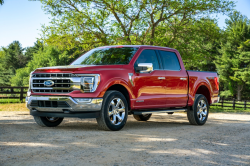
Ford Recalls 18 F-150 Lightning EV Trucks to Fix Battery Defect
In a recent development, American multinational automaker Ford has recalled 18 of its F-150 Lightning electric vehicles due to a potential battery defect that could lead to a fire. The company has announced that the root cause of the vehicle fire is tied to the battery-cell factory of its supplier.
The impacted models were manufactured at Ford's Dearborn Truck Plant from May 24 to July 1, 2021. The recalled vehicles were equipped with a particular motor assembly that contained a battery-cell manufactured at the LG Chem factory in Ochang, South Korea. The defect in the battery was caused by a torn anode tab and sub-standard welding leading to a fire risk.
The recall clearly indicates that the move towards mainstream vehicle electrification cannot be taken lightly. It highlights the importance of battery safety and the need for clear regulations and guidelines to mitigate risk.
Ford has confirmed that it is reaching out to the affected customers and will be repairing and replacing the faulty batteries as necessary. The automaker has also stated that all future Lightning pickups will have batteries supplied by another company.
The recall has not affected Ford's initial plans to roll out the F-150 Lightning electric pickups later this year. The vehicle is expected to hit the production line in the spring of 2022.

The F-150 Lightning is Ford's first fully electric pickup truck with a range of over 300 miles on a single charge. It has been touted as one of the most anticipated vehicles of the year and is expected to compete head to head with Tesla's Cybertruck.
The recall of the 18 affected vehicles highlights the importance of battery safety in electric vehicles. It also underlines the need for automakers to implement clear guidelines and regulations to ensure the safety of their customers.
In conclusion, Ford's recall of its F-150 Lightning electric vehicles highlights the importance of battery safety in electric vehicles. While the recall has affected only a small percentage of the total number of manufactured vehicles, it clearly demonstrates the importance of proper regulations and guidelines to ensure the safety of the cars and their occupants. It is a wake-up call for automakers to prioritize battery safety and to take significant measures to mitigate the risk of battery defects. We hope that Ford's response to this issue is a milestone for the auto industry to learn from its mistakes and ensure the highest levels of safety in its vehicles.
Keywords: L17L3PE0 battery, Ford, F-150 Lightning EV Trucks, Battery Defect, Battery Safety